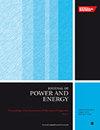使用不同保真度分析现代商用高压涡轮转子的气动热性能
IF 1.1
4区 工程技术
Q3 ENGINEERING, MECHANICAL
Proceedings of the Institution of Mechanical Engineers, Part A: Journal of Power and Energy
Pub Date : 2024-09-14
DOI:10.1177/09576509241283129
引用次数: 0
摘要
在现代喷气发动机薄膜冷却涡轮叶片等复杂几何形状的设计和优化领域,计算流体动力学(CFD)模拟被普遍采用。随着人们对更高涡轮入口温度的追求日益强烈,计算分析如何准确预测这些关键部件的金属温度和传热系数变得至关重要。本研究探讨了描述这些部件运行特征的关键物理因素对计算模型准确性的影响。特别是,研究了包括流体和固体领域之间热能交换的影响,以及转子和定子之间非稳态相互作用的建模。研究重点是商用喷气发动机的全功能一级半高压涡轮,利用专有软件进行三维雷诺平均纳维-斯托克斯流模拟。为模拟流固热相互作用,进行了稳态共轭传热(CHT)模拟。然后将 CHT 结果与热涂料测试中获得的实验数据进行比较,结果一致程度很高。此外,还在绝热壁条件下执行了相滞模拟,以评估定转子相互作用对近壁气体温度的影响。这项工作表明,通过使用相位滞后技术模拟定转子界面的周期性不稳定性,与稳态模型相比,最大近壁气体温度预测值显著提高,有时甚至超过 100K。这项工作的研究结果还表明,用于模拟叶片表面存在薄膜冷却孔排的简化 "条带 "源项只有在额定条件下才能达到令人满意的精度。在不同条件下使用时,不应该根据主流量对每个源条提供的质量流进行线性缩放,而应该根据新的条件从头开始重新计算。本文章由计算机程序翻译,如有差异,请以英文原文为准。
Analysis of the aerothermal performance of modern commercial high-pressure turbine rotors using different levels of fidelity
In the field of design and optimization of sophisticated geometries such as film-cooled turbine blades of modern jet engines, Computational Fluid Dynamics (CFD) simulation is commonly employed. As the pursuit for higher turbine entry temperatures intensifies, it becomes crucial for computational analyses to offer accurate predictions of metal temperatures and heat transfer coefficients on these critical components. This study investigates the impact of key physical factors that characterize the operation of these components on the accuracy of the computational model. In particular, the effects of including the exchange of thermal energy between the fluid and solid domains, as well as modelling the unsteady interaction between the rotor and stator are studied. The research focuses on a fully featured one-and-a-half stage high-pressure turbine of a commercial jet engine, utilizing proprietary software for conducting 3D Reynolds-Averaged Navier-Stokes flow simulations. To model the fluid-solid thermal interaction, steady-state Conjugate Heat Transfer (CHT) simulations are performed. The CHT results are then compared with experimental data obtained from a thermal paint test, achieving good levels of agreement. Additionally, phase-lag simulations are executed under adiabatic-wall conditions to evaluate the influence of stator-rotor interaction on near-wall gas temperatures. This work shows that, by modelling the periodic unsteadiness at the stator-rotor interface with a phase-lag technique, the maximum near-wall gas temperature prediction is significantly increased, sometimes more than 100K, with respect to the steady-state model one. Findings from this work also suggest that simplified “strip” source terms used to model the presence of film cooling hole rows on the surface of a blade can be used with satisfactory accuracy only for nominal conditions. The mass flows delivered by each source strip should not be linearly scaled based on mainstream quantities for use in different conditions, but they should be recalculated from scratch for the new conditions.
求助全文
通过发布文献求助,成功后即可免费获取论文全文。
去求助
来源期刊

CiteScore
3.30
自引率
5.90%
发文量
114
审稿时长
5.4 months
期刊介绍:
The Journal of Power and Energy, Part A of the Proceedings of the Institution of Mechanical Engineers, is dedicated to publishing peer-reviewed papers of high scientific quality on all aspects of the technology of energy conversion systems.
 求助内容:
求助内容: 应助结果提醒方式:
应助结果提醒方式:


